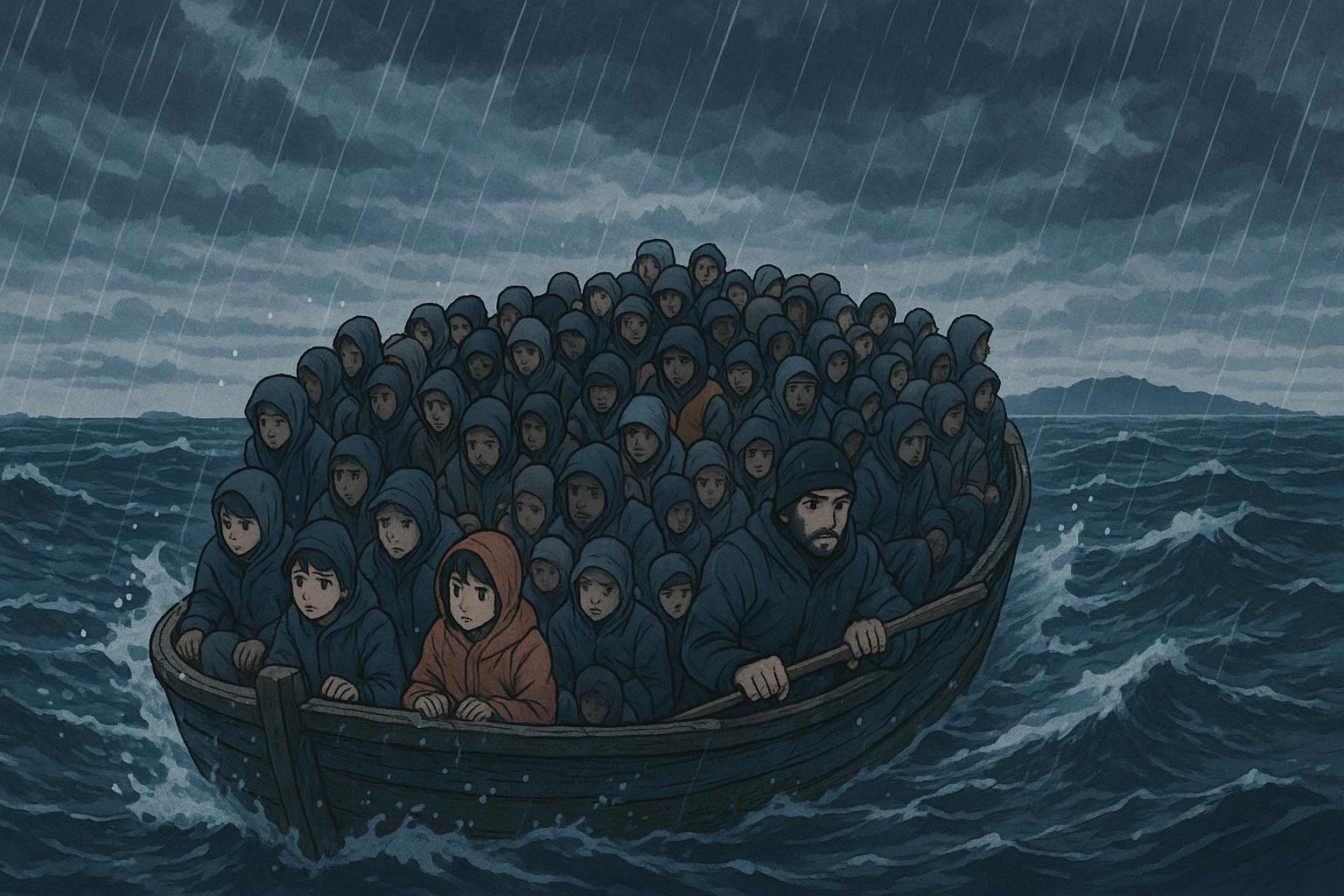Despite Prime Minister Keir Starmer’s pledge to ‘smash the gangs’ behind Channel migrant crossings, illegal arrivals in small boats have surged to record levels, exposing cracks in the government’s immigration strategy and cross-channel cooperation.
When Sir Keir Starmer assumed the role of Prime Minister in July 2024, he made a bold commitment to “smash the gangs” responsible for the distressing human trafficking across the English Channel. However, as of now, his administration has only set records for the number of illegal migrants making this treacherous journey. The figures released recently underscore the gravity of the situation: on a single Saturday, approximately 1,200 migrants arrived in small boats, marking the highest daily total recorded this year.
Amidst public concern regarding these escalating numbers, Starmer’s statements have raised eyebrows. He claimed that “almost 30,000 people” had been removed from the UK, a statement that many interpret as misleading. This figure encompasses not just those who crossed the Channel but also includes foreign nationals without permission to remain, such as students who overstayed their visas and failed asylum seekers from previous years. In stark contrast, the number of migrants specifically removed from small boats in the past year plummeted by 3 per cent, highlighting a significant gap between rhetoric and reality.
Historical context illustrates the continuing challenges surrounding migration. The former Conservative government had struggled for years to halt small boat crossings, delivering unfulfilled pledges that are now being inherited by Labour. While the Labour government has indicated a commitment to targeting smuggling gangs, many analysts warn that without a significant expansion of legal migration routes, their approach risks repeating past failures, much like their predecessors.
The recent data underscores persistent concerns regarding the effectiveness of cross-channel cooperation. A French report critiqued the UK’s coordination efforts, labelling them as ‘uncertain’. This criticism reflects ongoing difficulties in intelligence sharing, particularly concerning the gathering of actionable information about migrant departures. The UK’s Home Office has refuted these claims, stating that the report mischaracterises current levels of collaboration.
Tragically, the rising count of migrant deaths in the Channel adds a somber layer to this crisis. Recent incidents have highlighted the substantial risks involved in these crossings, with five individuals—including a young girl—losing their lives during an overcrowded boat’s attempted crossing. These fatalities contribute to an alarming death toll that has reached 73 over the past seven years, raising critical questions about the safety measures in place for vulnerable migrants.
Starmer’s government, having pledged to work closely with Brussels to “reset” the UK’s relationship with the EU, faces scrutiny for its perceived reluctance to demand accountability from France regarding its border controls. Despite contributing close to £600 million since 2010 to aid France in patrolling its coastline, the UK continues to witness an influx of asylum seekers arriving via small boats. This raises frustration among many British citizens, who feel let down by both local and foreign politicians who appear unwilling to confront the growing crisis effectively.
In light of the challenges ahead, Starmer’s attempts to reinstate the controversial Rwanda deportation scheme have been less than successful, attracting criticism. While expressing intentions to establish new holding hubs in Albania, these efforts have so far resulted in little more than diplomatic embarrassment. Until concrete measures are implemented to deter illegal crossings, the landscape remains fraught with uncertainty, leaving many to question whether the Prime Minister is equipped to regain the trust of the British people on this crucial issue.
 Reference Map:
Reference Map:
- Paragraph 1 – [1], [2]
- Paragraph 2 – [1], [2], [4]
- Paragraph 3 – [3], [6]
- Paragraph 4 – [4], [5]
- Paragraph 5 – [1], [3]
- Paragraph 6 – [1], [2], [7]
Source: Noah Wire Services
- https://www.dailymail.co.uk/debate/article-14777823/Keir-Starmer-migrant-figures-betrayed-British-people-ALP-MEHMET.html?ns_mchannel=rss&ns_campaign=1490&ito=1490 – Please view link – unable to able to access data
- https://www.ft.com/content/ec018bba-71e8-4d2a-ad69-0c9b9ae4c323 – This article examines the challenges faced by the UK Labour government’s strategy to address small boat crossings in the English Channel. It highlights the political and practical difficulties in curbing these crossings, noting that while the previous Conservative government had unfulfilled pledges to ‘stop the boats,’ the Labour government’s focus on targeting smuggling gangs has yet to yield results. The piece suggests that without expanding legal migration routes, the current approach may mirror previous policy failures, potentially inheriting the same political liabilities as the Conservatives.
- https://apnews.com/article/b09e35709e13d7c5677dbd717934b080 – A French report by the Court of Accounts criticises the UK’s coordination with France in curbing migrant crossings over the English Channel, labelling the effectiveness of existing cooperation as ‘uncertain.’ France reportedly struggles to obtain usable information from the UK regarding the departure of migrants in small boats, leading to an imbalance in intelligence exchange. Despite joint efforts, the UK Home Office rejects these allegations, asserting that the report is outdated and misrepresents current cooperation levels.
- https://www.ft.com/content/8f76ff2b-6c5e-4352-9e2d-0567089cc7c0 – This article reports on a tragic incident in which five people, including a seven-year-old girl, died during a Channel crossing attempt. The overcrowded boat, carrying 112 people, stalled near the coast of Wimereux, France, causing several passengers to fall into the water. This incident brings the total death toll for Channel crossings to 15 that year and 73 over the past seven years. The piece also discusses the UK’s controversial policy to send asylum seekers to Rwanda, aiming to deter such dangerous crossings.
- https://apnews.com/article/4236f4332ec68280754921bf17a2ee40 – In 2023, migrant crossings of the English Channel decreased by more than a third compared to 2022, with 30,000 crossings recorded, down from over 45,000 the previous year. This marks the first decline since record-keeping began but remains the second-highest number since 2018. Prime Minister Rishi Sunak has prioritised halting these crossings, advocating for strict immigration laws to address the influx of migrants travelling perilously from France to England.
- https://www.lemonde.fr/en/europe/article/2024/04/02/channel-crossings-are-on-the-rise_6667176_143.html – After a 35% decrease in 2023, Channel crossings between France and the UK have surged again at the beginning of 2024, with over 4,600 migrants reaching England. March 20 saw 514 people crossing in 10 boats, and at least 10 people have died so far this year. This resurgence returns to 2022 numbers when over 45,000 migrants crossed. French authorities attributed the 2023 decline to effective police actions and an agreement with Albania which dramatically reduced Albanian crossings.
- https://www.reuters.com/world/uk/uk-migrant-boat-crossings-hit-19-month-high-adding-pressure-sunak-2024-06-19/ – More than 800 asylum seekers arrived in Britain via small boats on a single day, marking the highest figure since late 2022. This adds pressure on Prime Minister Rishi Sunak ahead of a national election. Provisional data from Britain’s interior ministry showed that 882 migrants arrived on Tuesday, with the yearly total surpassing 12,300. ‘Stopping the boats’ has been a key pledge of Sunak, whose immigration policy includes deporting asylum seekers to Rwanda. However, this plan has not yet taken effect due to the earlier-than-expected election call.













